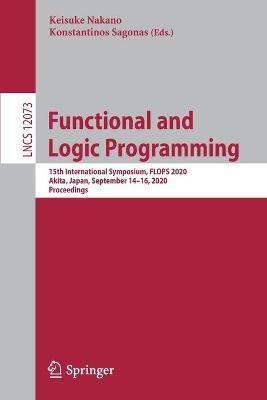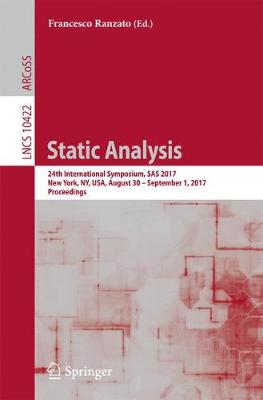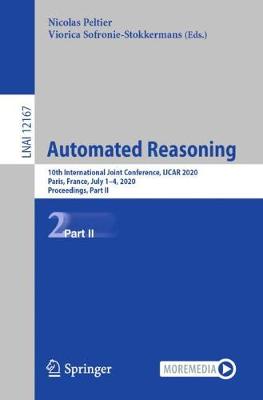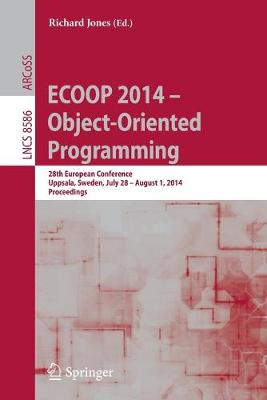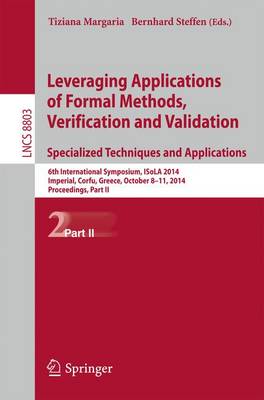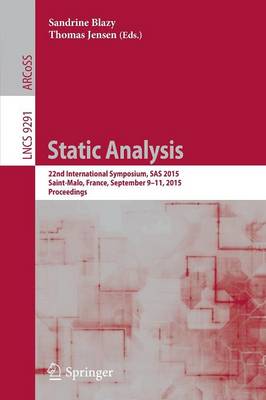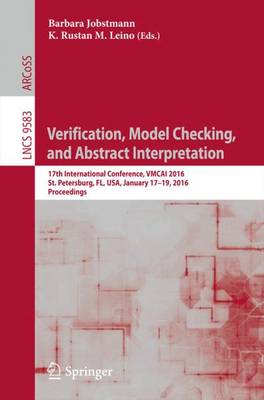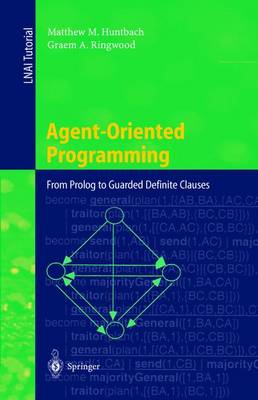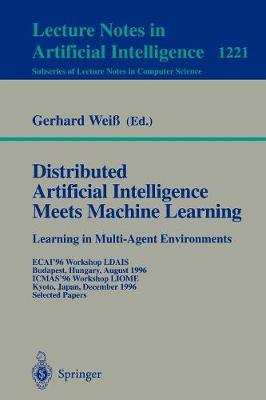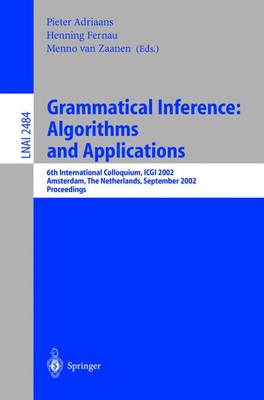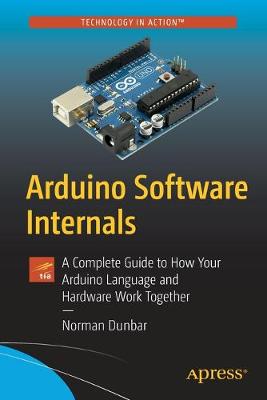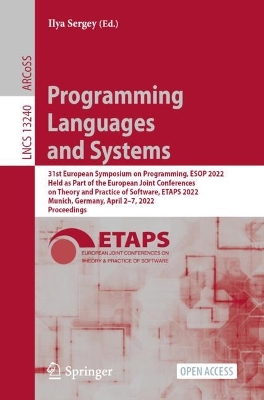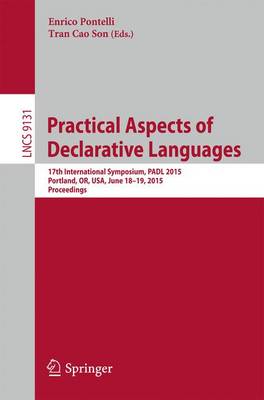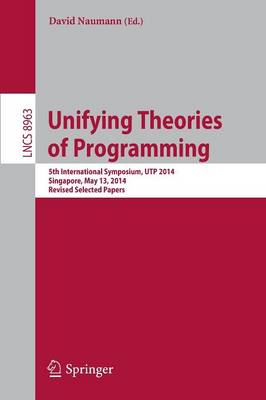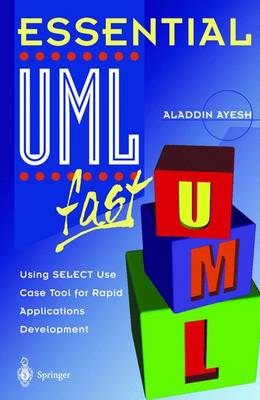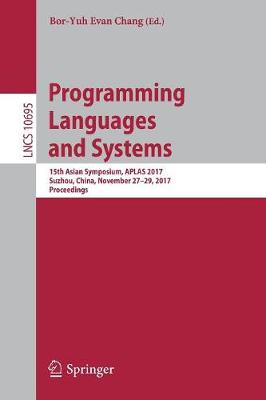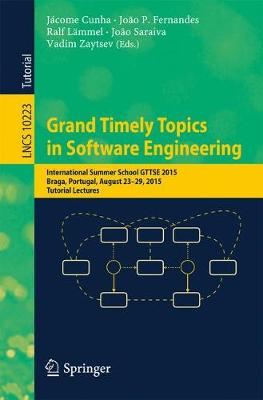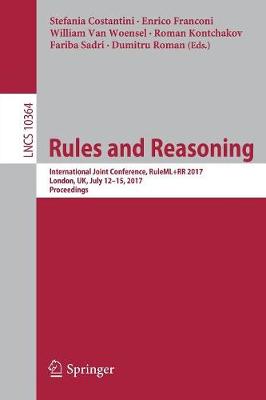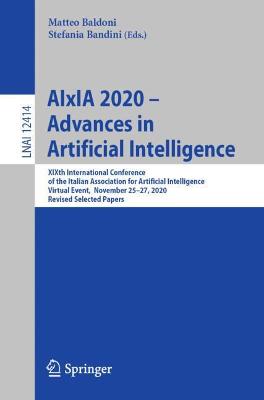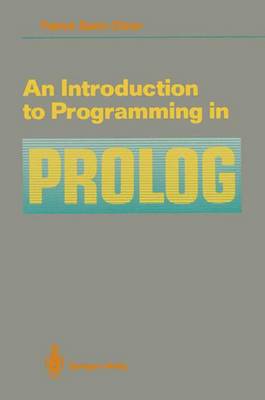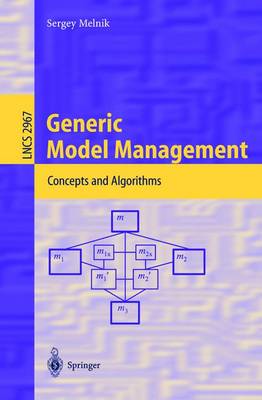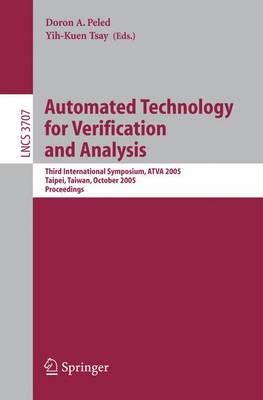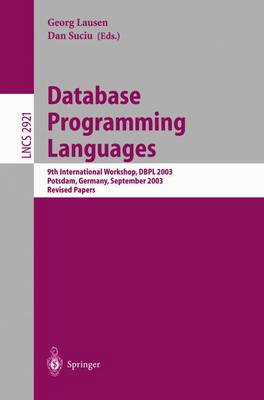This book constitutes the proceedings of the 15th International Symposium on Functional and Logic Programming, FLOPS 2020, held in Akita, Japan*, in September 2020. The 12 papers presented in this volume were carefully reviewed and selected from 25 submissions. They cover all aspects of the design, semantics, theory, applications, implementations, and teaching of declarative programming focusing on topics such as functional programming, logic programming, declarative programming, constraint pro...
Static Analysis (Programming and Software Engineering, #10422) (Lecture Notes in Computer Science, #10422)
This book constitutes the refereed proceedings of the 24th International Static Analysis Symposium, SAS 2017, held in New York, NY, USA, in August/September 2017. The 22 papers presented in this volume were carefully reviewed and selected from 50 submissions. The papers cover various aspects of the presentation of theoretical, practical, and applicational advances in area of static analysis that is recognized as a fundamental tool for program verification, bug detection, compiler organization, p...
This two-volume set LNAI 12166 and 12167 constitutes the refereed proceedings of the 10th International Joint Conference on Automated Reasoning, IJCAR 2020, held in Paris, France, in July 2020.* In 2020, IJCAR was a merger of the following leading events, namely CADE (International Conference on Automated Deduction), FroCoS (International Symposium on Frontiers of Combining Systems), ITP (International Conference on Interactive Theorem Proving), and TABLEAUX (International Conference on Analytic...
ECOOP 2014 -- Object-Oriented Programming (Programming and Software Engineering, #8586)
This book constitutes the proceedings of the 28th European Conference on Object-Oriented Programming, ECOOP 2014, held in Uppsala, Sweden, in July/August 2014. The 27 papers presented in this volume were carefully reviewed and selected from 101 submissions. They are organized in topical sections named: analysis; design; concurrency; types; implementation; refactoring; JavaScript, PHP and frameworks; and parallelism.
The two-volume set LNCS 8802 and LNCS 8803 constitutes the refereed proceedings of the 6th International Symposium on Leveraging Applications of Formal Methods, Verification and Validation, ISoLA 2014, held in Imperial, Corfu, Greece, in October 2014. The total of 67 full papers was carefully reviewed and selected for inclusion in the proceedings. Featuring a track introduction to each section, the papers are organized in topical sections named: evolving critical systems; rigorous engineering of...
Static Analysis (Lecture Notes in Computer Science, #9291)
This book constitutes the refereed proceedings of the 22nd International Static Analysis Symposium, SAS 2015, held in Saint-Malo, France, in September 2015. The 18 papers presented in this volume were carefully reviewed and selected from 44 submissions. All fields of static analysis as a fundamental tool for program verification, bug detection, compiler optimization, program understanding, and software maintenance are addressed, featuring theoretical, practical, and application advances in...
This book constitutes the refereed proceedings of the 17th International Conference on Verification, Model Checking, and Abstract Interpretation, VMCAI 2016, held in St. Petersburg, FL, USA, in January 2016. The 24 full papers together with 2 invited talks and 1 abstract presented were carefully reviewed and selected from 67 submissions. VMCAI provides topics including: program verification, model checking, abstractinterpretation and abstract domains, program synthesis, static analysis,type...
A book that furnishes no quotations is, me judice, no book – it is a plaything. TL Peacock: Crochet Castle The paradigm presented in this book is proposed as an agent programming language. The book charts the evolution of the language from Prolog to intelligent agents. To a large extent, intelligent agents rose to prominence in the mid-1990s because of the World Wide Web and an ill-structured network of multimedia information. Age- oriented programming was a natural progression from object-orien...
The complexity of systems studied in distributed artificial intelligence (DAI), such as multi-agent systems, often makes it extremely difficult or even impossible to correctly and completely specify their behavioral repertoires and dynamics. There is broad agreement that such systems should be equipped with the ability to learn in order to improve their future performance autonomously. The interdisciplinary cooperation of researchers from DAI and machine learning (ML) has established a new and v...
Grammatical Inference: Algorithms and Applications (Lecture Notes in Computer Science, #2484)
The Sixth International Colloquium on Grammatical Inference (ICGI2002) was held in Amsterdam on September 23-25th, 2002. ICGI2002 was the sixth in a series of successful biennial international conferenceson the area of grammatical inference. Previous meetings were held in Essex, U.K.; Alicante, Spain; Mo- pellier, France; Ames, Iowa, USA; Lisbon, Portugal. This series of meetings seeks to provide a forum for the presentation and discussion of original research on all aspects of grammatical infer...
It’s not enough to just build your Arduino projects; it’s time to actually learn how things work! This book will take you through not only how to use the Arduino software and hardware, but more importantly show you how it all works and how the software relates to the hardware. Arduino Software Internals takes a detailed dive into the Arduino environment. We’ll cover the Arduino language, hardware features, and how makers can finally ease themselves away from the hand holding of the Arduino envir...
Programming Languages and Systems (Lecture Notes in Computer Science, #13240)
This open access book constitutes the proceedings of the 31st European Symposium on Programming, ESOP 2022, which was held during April 5-7, 2022, in Munich, Germany, as part of the European Joint Conferences on Theory and Practice of Software, ETAPS 2022. The 21 regular papers presented in this volume were carefully reviewed and selected from 64 submissions. They deal with fundamental issues in the specification, design, analysis, and implementation of programming languages and systems.
This book constitutes the refereed proceedings of the 17th International Symposium on Practical Aspects of Declarative Languages, PADL 2015, held in Portland, OR, USA, in June 2015. The 10 revised papers presented were carefully reviewed and selected from numerous submissions. The papers cover all forms of declarative concepts, including, functional, logic, constraints, etc.
Heute sind es Computer und Handys, die miteinander vernetzt sind und den Informationszugriff immer und überall ermöglichen. Schon bald aber lassen sich kleinste, billige und über Funk miteinander kommunizierende Prozessoren und Sensoren in fast beliebige Dinge einbauen. "Smarte" Alltagsgegenstände können dann ihre Umgebung erfassen, haben Zugriff auf beliebige Ressourcen im Internet und wissen, wo sie sind und wer in der Nähe ist. Wie aber leben wir in einer solchen total informatisierten und ve...
This book constitutes the refereed proceedings of the 5th International Symposium on Unifying Theories of Programming, UTP 2014, held in Singapore, Singapore, in May 13, 2014, co-located with the 19th International Symposium on Formal Methods, FM 2014. The 7 revised full papers presented together with one invited talk were carefully reviewed and selected from 11 submissions. They deal with numerous formal notations and theories of programming, such as abstraction, refinement, choice, termination...
Essential UML fast introduces the concepts of object-oriented analysis, design and programming, using the Unified Modeling Language (UML). UML is one of the best known modeling languages in the object-oriented software development world, and is fast becoming a standard amongst OO software developers. The book contains plenty of examples and detailed illustrations, making it easy for readers to get up and running with UML fast. In providing these examples the author relies on one of the well know...
Programming Languages and Systems (Programming and Software Engineering, #10695)
This book constitutes the proceedings of the 15th Asian Symposium on Programming Languages and Systems, APLAS 2017, held in Suzhou, China, in November 2017. The 24 papers presented in this volume were carefully reviewed and selected from 56 submissions. They were organized in topical sections named: security; heap and equivalence reasoning; concurrency and verification; domain-specific languages; semantics; and numerical reasoning. The volume also contains two invited talks in full-paper length....
This tutorial volume includes the revised and extended tutorials (briefings) held at the 5th International Summer School on Grand Timely Topics in Software Engineering, GTTSE 2015, in Braga, Portugal, in August 2015. GTTSE 2015 applied a broader scope to include additional areas of software analysis, empirical research, modularity, and product lines. The tutorials/briefings cover probabilistic program analysis, ontologies insoftware engineering, empirical evaluation of programming and programmin...
This book constitutes the proceedings of the International Joint Conference on Rules and Reasoning, RuleML+RR 2017, held in London, UK, during July 2017. This is the first conference of a new series, joining the efforts of two existing conference series, namely “RuleML” (International Web Rule Symposium) and “RR” (Web Reasoning and Rule Systems). The 16 regular papers presented together with 2 keynote abstracts were carefully reviewed and selected from 29 submissions. The RR conference series h...
AIxIA 2020 – Advances in Artificial Intelligence (Lecture Notes in Computer Science, #12414)
This book constitutes the refereed post proceedings of the XIXth International Conference of the Italian Association for Artificial Intelligence, AIxIA 2020, held in Milano, Italy, in November 2020.Due to the COVID-19 pandemic, the conference was "rebooted"/ re-organized w.r.t. the original format.The 27 full papers were carefully reviewed and selected from 89 submissions. The society aims at increasing the public awareness of Artificial Intelligence, encouraging the teaching and promoting resea...
This book is an introduction to Prolog (£rQgramming in ~ic). It presents the basic foundations of Prolog and basic and fundamental programming methods. This book is written for programmers familiar with other programming languages, as well as for novices in computer science, willing to have an original introduction to programming. The approach adopted in this book is thus based on methodological elements together with some pragmatic aspects. The book is composed of two parts. In the fIrst part t...
Generic Model Management (Lecture Notes in Computer Science, #2967)
by Sergey Melnik
Many challenging problems in information systems engineering involve the manipulation of complex metadata artifacts or models, such as database schema, interface specifications, or object diagrams, and mappings between models. Applications solving metadata manipulation problems are complex and hard to build. The goal of generic model management is to reduce the amount of programming needed to solve such problems by providing a database infrastructure in which a set of high-level algebraic operat...
The Automated Technology for Veri?cation and Analysis (ATVA) international symposium series was initiated in 2003, responding to a growing interest in formal veri?cation spurred by the booming IT industry, particularly hardware design and manufacturing in East Asia. Its purpose is to promote research on automated veri?cation and analysis in the region by providing a forum for int- action between the regional and the international research/industrial commu- ties of the ?eld. ATVA 2005, the third...
Database Programming Languages (Lecture Notes in Computer Science, #2921)
The papers in this volume represent the technical program of the 9th Biennial WorkshoponDataBasesandProgrammingLanguages(DBPL2003),whichwas held on September 6-8, 2003, in Potsdam, Germany. The workshop meets every two years, and is a well-established forum for ideas that lie at the intersection of database and programming language research. DBPL 2003 continued the t- dition of excellence initiated by its predecessors in Rosco?, Finistre (1987), S- ishan, Oregon (1989), Nafplion, Argolida (1991)...
